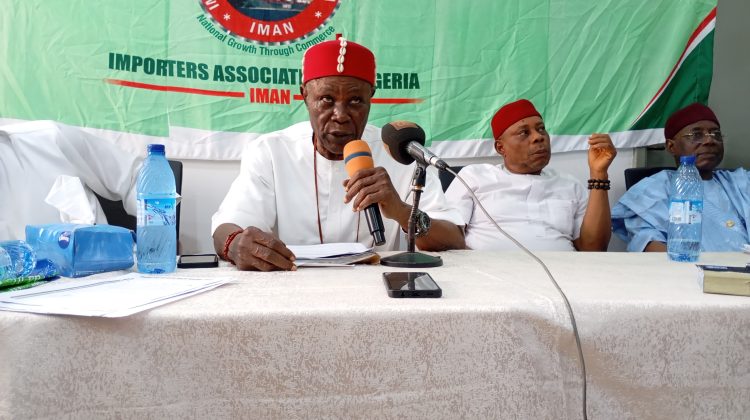
IMAN Holds NEC Meeting, Warns Against 4% FOB Levy by Customs
![]()
IMAN Holds NEC Meeting, Warns Against 4% FOB Levy by Customs
…… describes it as a *policy blunder”
……as Clarion Shipping unveils new
Nigeria-China-Saudi Arabia Shipping Line
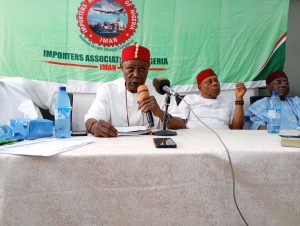
Acting National President and Chairman, Board of Trustees, High Chief Gilbert E. Obi,,flanked by other executive members of IMAN, speaking at the event on Wednesday,in Lagos
By Frank Odinukaeze
The Importers Association of Nigeria (IMAN) has raised strong objections to the proposed 4% Free-On-Board (FOB) levy by the Nigeria Customs Service, describing it as a “policy blunder” that will cripple industries, fuel inflation, and worsen the cost of living for Nigerians.
Speaking at the National Executive Council (NEC) meeting of the association held on Wednesday at its Southwest Zonal Secretariat in Apapa, Lagos, the Acting National President and Chairman, Board of Trustees, High Chief Gilbert E. Obi, said the new levy would impose unbearable costs on businesses and consumers.
According to him, “Nigeria is an import-dependent nation. This levy will instantly hike the costs of gas, spare parts, machinery, and raw materials, crippling industries and punishing consumers. Already, a 2006 Toyota Corolla now costs between ₦6–9 million.”
He further highlighted the drastic rise in operational costs for freight forwarders, noting that license renewal fees for clearing agents had jumped from ₦215,000 to ₦4 million, while new freight forwarder licenses had skyrocketed from ₦500,000 to ₦10 million.
Obi dismissed Customs’ justification that the levy would fund its modernization programme, anchored on a platform known as B’odogwu, describing it as “epileptic if not comatose.” He warned that committing trillions to a system that may be obsolete by January 2026—when the Federal Inland Revenue Service (FIRS) is set to take over Customs revenue collection—was wasteful.
“The 4% FOB levy is much higher than the 1% CISS it replaces. Peer countries like Ghana maintain just 1%. Implementing this levy will destabilize the naira, increase landed costs, and add an estimated ₦3–₦4 trillion annually to freight costs—a burden that will be transferred directly to Nigerian consumers,” he stressed.
The NEC meeting, which brought together members of the Board of Trustees, National Executive Committee, zonal chairmen, and state administrators, also addressed internal challenges facing the association. Obi acknowledged the existence of splinter groups within IMAN but called for unity and reconciliation, urging members to embark on a “peace mission” to strengthen the association.
He commended the Southwest Zone for hosting the meeting and appealed to members to contribute ideas that would foster peace and position IMAN to play a stronger role in defending the interests of importers and the Nigerian economy.
Earlier in his welcome address, the Chairman of the Western Zone, Chief (Dr.) Austin Kelly, said the gathering marked “a new era and a defining moment” in repositioning the association to play a stronger role in Nigeria’s international trade and logistics supply chain.
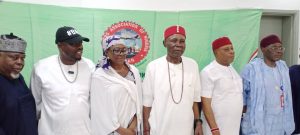
The meeting, which drew participants from the Board of Trustees (BOT), national executives, state chapters from all 36 states and the FCT, as well as technical partners, stakeholders and the press, had initially been scheduled for September 1 but was postponed due to logistics challenges.
Chief Kelly, while reflecting on IMAN’s journey since its registration with the Corporate Affairs Commission in 2007, noted that the association has grown to a membership strength of over 4,500 importers nationwide. He reiterated IMAN’s core objectives, including protecting members’ investments, combating fraudulent importers, advocating on trade policies, and curbing smuggling and other malpractices within the industry.
The chairman, however, expressed concern over certain recent developments in the sector, particularly the provisions of the Nigeria Customs Service Act 2023, which introduced a 4% Free on Board (FOB) fee for funding customs operations, replacing the 1% CISS charge.
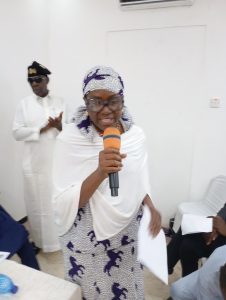
Eloka Belladine Ifeoma Vice president Clarion Shipping West Africa, speaking at the event
Describing the policy as “draconian, obnoxious, and injurious,” Kelly warned that it was already depleting members’ investments, with many importers counting losses.
He also raised alarm over disruptions caused by the ongoing test-run of the B’ Odogwu technology, which he said had resulted in increased demurrage and storage costs.
“Most of our members are almost out of business, with some already considering relocating to neighbouring countries,” he lamented.
Kelly stressed that the NEC meeting would provide a platform for frank discussions on pressing issues affecting the association, including leadership direction, organizational structure, revenue collection, cohesion, mistrust, and the appointment of technical assistance.
He assured members that IMAN would continue to advocate for a business-friendly environment anchored on ease of doing business, sustainable reforms, and fair fiscal policies.
The chairman concluded with optimism that the deliberations would yield workable solutions to reposition IMAN for future growth and prosperity.
Meanwhile Clarion Shipping West Africa ,has announced the launch of a new shipping line that will directly connect Nigeria with China and Saudi Arabia for both imports and exports. The announcement was made by the Vice President of Clarion Shipping, Eloka Belladine Ifeoma, during the maiden edition of the National Executive Council (NEC) meeting of the Importers Association of Nigeria (IMAN) held in Lagos.
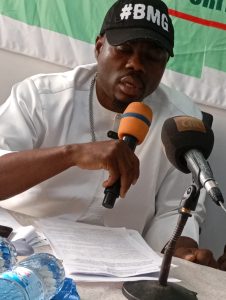
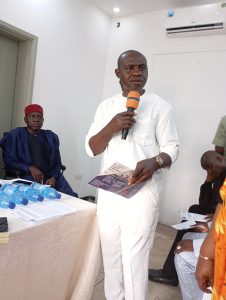
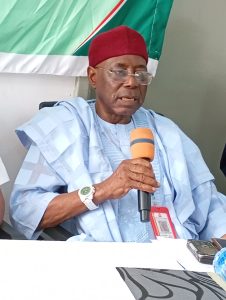
In her goodwill message, Ifeoma praised Nigerian importers for their pivotal role in sustaining economic activities across multiple sectors, noting that without their efforts, industries such as shipping, oil and gas, aviation, and trading would struggle to survive.
“You are the backbone of economic activity in Nigeria. Without you, there would be no shipping companies, no airlines, and no oil and gas firms. You open the doors of existence for all of us,” she said.
Highlighting the significance of the new shipping line, Ifeoma disclosed that the initiative was designed to reduce trade costs, shorten delivery timelines, and ease the burden of clearing goods in Nigeria. She assured importers that Clarion Shipping would offer competitive freight rates and provide flexible clearance options, including free days at ports to facilitate seamless operations.
“We want this shipping line to be seen as our own – by Nigerians, for Nigerians. By patronizing Clarion Shipping Line, you will be supporting a homegrown initiative that ensures your goods are delivered on time, at reduced costs, and without unnecessary stress,” she explained.
The Vice President also emphasized that the new service would address long-standing industry challenges such as demurrage and auctioning of goods, pledging that Clarion would step in to protect importers’ interests.
Beyond logistics, Ifeoma urged stakeholders to recognize the wider national benefits of supporting a local shipping line.
“It is high time we came home. When we keep our money here, we can use it to develop our roads, schools, hospitals, and other vital infrastructure,” she stated.
Clarion Shipping further announced that its online booking platform would go live at the end of September, allowing importers to make reservations, track shipments, and process delivery requests seamlessly. The platform will also provide support through representatives who can assist importers with bookings and documentation.
The unveiling of the new shipping line at the IMAN NEC meeting marks a significant milestone for Nigeria’s maritime sector, promising to strengthen trade links, reduce capital flight, and foster economic development through indigenous participation in global shipping.
The Maiden NEC meeting of a united IMAN was attended by members from all parts of the country including Abuja ..








